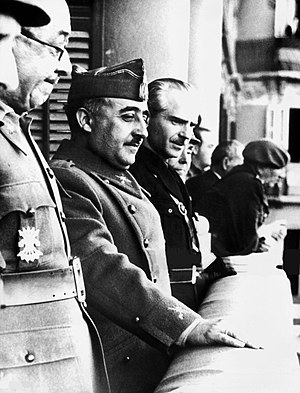User:Mu/Sandbox3
This article is incomplete because it is pending further input from participants, or it is a work-in-progress by one author. Please comment on this article's talk page to share your input, comments and questions. Note: To contribute to this article, you may need to seek help from the author(s) of this page. |
 Gen. Alejandro Rouco (center left) prepares to announce the transfer of power to the public in Carutagua following the purge's end. | |
| Native name | Fin de semana del Cannonade |
|---|---|
| Duration | April 2 - April 5, 1926 |
| Location | Nuxica |
| Also known as | Operation Absolute Will, the Roucan Coup, La Traición Intentada (by pro-Rouco supporters), La Victoria (by pro-Rouco propaganda), La Limpieza (amongst high-level Rouco supporters) |
| Type | Coup d'etat |
| Cause |
|
| Organised by | |
| Participants | Nuxican Army, Civil Guard, Guardianes de la Nación |
| Outcome |
|
| Casualties | |
| Reported 129, estimates range from ~250 to ~1000 | |
| Missing | 30 officially reported missing, estimates range from 100 to 120 public officials |
| Arrests | 3000-5000 overall detentions |
The Weekend of the Cannonade (Auratian: Fin de semana del Cannonade), or the Roucan Coup, also known as Operation Absolute Will (Auratian: Operación Absoluta Voluntad), was a coup d'etat and purge that took place in Nuxica from the 2nd of April to the 5th of April, 1926. On that day, Alejandro Rouco, General of the Nuxican Army, launched an internal operation against Martín Fernán–then leader of the Nuxican military government Rouco was supported by nationalist politician and buisiness leader Bruno Noboa, as well as military and paramilitary leaders Maximiliano Vera and Emmanuel Arrabal. Following the seizure of power Rouco ordered a systematic purge of all major Fernanists and influential functionalists within the junta, consolidating his power as leader of the junta and guaranteeing continued political and economic association with Estmere, Werania, Etruria, and Narozalica. The official narrative by pro-Rouco sources claimed that the coup was actually launched by functionalists, and that his forces were merely reacting in defense of the junta in order to maintain national stability and security.
The primary agents of the coup were the Nuxican Army-led by Rouco, the Civil Guard-led by Vera, and the Guardianes de la Nación-led by Arrabal. Many of those killed, however, were members of Nuxican Army and Guardianes aligned with Fernan. Fernan himself was captured and summarily executed in a raid on his estancia, making him the most high-profile victim of the operation. Members of the Functionalist Party, such as party chairman Adán Quesada, were also arrested on charges of treason-with many also being summarily executed or imprisoned. Politicians also not aligned with the junta were also detained, with many being imprisoned or forced to swear loyalty to the military government. Finally, many remaining members of the Nuxican Section of the Workers' International who had previously escaped the death penalty in the aftermath of the Nuxican Revolution were also killed.
Rouco, a staunch Nuxican nationalist, viewed Martín Fernán's insistence on developing close relations with Functionalist Gaullica-at the pressuring of Adán Quesada, as the beginning stages of Nuxica promulgating official defense agreements and accords. Such behavior was seen by many within the military and political establishment as highly treasonous, as they viewed such treaties as tantamount to Nuxican subservience to Gaullica. In addition Rouco was also wary of the influence Marirana, which Gaullica also had close ties to, could possibly have over Nuxican politics should diplomatic and military ties be furthered. Furthermore, Rouco was equally concerned with the rising 'functionalization' of the armed forces given Quesada's increasing authority within the military-which included the ability to weigh in on military organization and policy. The Functionalist Party had also been growing in power within the bureaucratic structure of Nuxica, in many ways forming quasi-deep state outside of military and nominal political authority. Finally, members of the Chamber of Industry and Commerce wished to maintain lucrative Euclean business ties, which had been placed under threat by Fernan's implementation of functionalist policies and growing closeness with Gaullica and Xiaodong(?).
129 soldiers and politicians were reported to have been killed as part of "anti-coup operations," though the true number of soldiers, officials, and civilians killed as a result of the coup and purge is believed to range widely, with the lower estimates being around 250 and the upper estimates being as high as 1000. A further 30 public officials were reported missing in the wake of the coup, though historians belive up to 120 public officials were forcibly disappeared. Up to a further 5000 individuals were arrested and interrogated, though not all were killed or tried.
Following the coup, the event began to be known officially as The Victory (Auratian: La Victoria), the Attempted Betrayal (Auratian: La Traición Intentada), or the the Weekend of Absolute Will (Auratian: El fin de semana de la Voluntad Absoluta) by pro-Rouco propaganda as part of a larger anti-functionalist, anti-Fernanist narrative. The latter name is actually a thinly-veiled reference to the name for the operation, as well as the codeword that set it in motion.